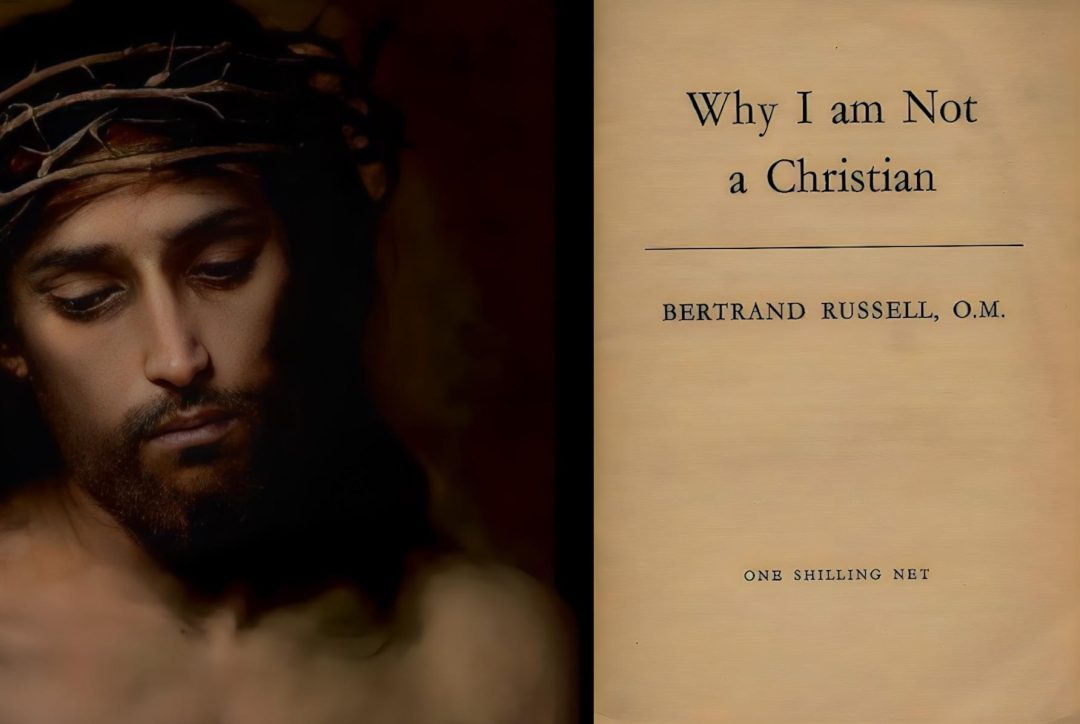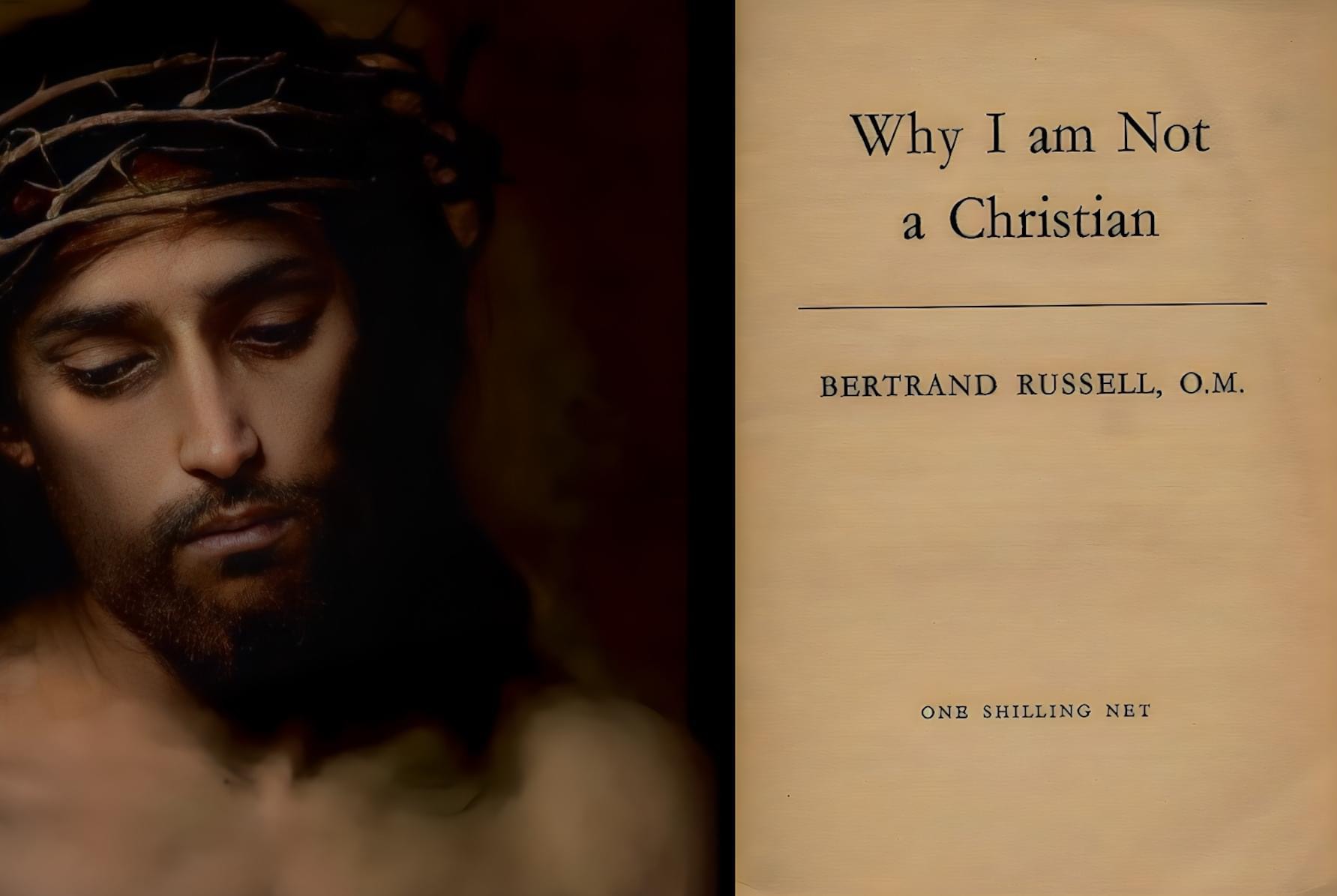Bertrand Russell’s full critique of Jesus Christ excerpt Why I Am Not a Christian (1927). Russell finds Christ “not as wise as Buddha and Socrates“ and as an individual “historically quite doubtful.“ Russell primarily takes issue with Jesus of Nazareth’s belief in Hell, the nature of his supposed miracles and that his second coming would be soon after his crucifixction and alleged resurrection.
━━
- Christ as historically doubtful
Historically it is quite doubtful whether Christ ever existed at all, and if He did we do not know anything about Him, so that I am not concerned with the historical question, which is a very difficult one. I do not believe that one can grant either the superlative wisdom or the superlative goodness of Christ as depicted in the Gospels; and here I may say that one is not concerned with the historical question. I am concerned with Christ as He appears in the Gospels, taking the Gospel narrative as it stands, and there one does find some things that do not seem to be very wise.
- Defects in teaching
For one thing, He certainly thought that His second coming would occur in clouds of glory before the death of all the people who were living at that time. There are a great many texts that prove that. He says, for instance: ‘Ye shall not have gone over the cities of Israel, till the Son of Man be come.’ Then He says: ‘There are some standing here which shall not taste death till the Son of Man comes into His kingdom’; and there are a lot of places where it is quite clear that He believed that His second coming would happen during the lifetime of many then living. That was the belief of His earlier followers, and it was the basis of a good deal of His moral teaching. When He said, ‘Take no thought for the morrow,’ and things of that sort, it was very largely because He thought that the second coming was going to be very soon, and that all ordinary mundane affairs did not count. I have, as a matter of fact, known some Christians who did believe that the second coming was imminent. I knew a parson who frightened his congregation terribly by telling them that the second coming was very imminent indeed, but they were much consoled when they found that he was planting trees in his garden. The early Christians did really believe it, and they did abstain from such things as planting trees in their gardens, because they did accept from Christ the belief that the second coming was imminent.
- The Problem of Hell
Then you come to moral questions. There is a very serious defect to my mind in Christ’s moral character, and that is that He believed in Hell. I do not myself feel that any person that is really profoundly humane can believe in everlasting punishment. Christ certainly as depicted in the Gospels did believe in everlasting punishment, and one does find repeatedly a vindictive fury against those people who would not listen to His preaching ‐‐ an attitude which is not uncommon with preachers, but which does somewhat detract from His believed superlative excellence. This doctrine, that hell‐fire is a punishment for sin, is a doctrine of cruelty. It is a doctrine that put cruelty into the world, and gave the world generations of cruel torture; and the Christ of the Gospels, if you could take Him as his chroniclers represent Him, would certainly have to be considered partly responsible. One will find that in the Gospels Christ said, “Ye serpents, ye generation of vipers, how can ye escape the damnation of Hell.“ That was said to people who did not like His preaching. It is not really to my mind quite the best tone, and there are a great many of these things about Hell. We do not, for instance find that attitude in Socrates. We find him quite bland and urbane toward the people who would not listen to him; and it is, to my mind, far more worthy of a sage to take that line than to take the line of indignation.
- The Holy Ghost
There is, of course, the familiar text about the sin against the Holy Ghost: “Whosoever speaketh against the Holy Ghost it shall not be forgiven him neither in this World nor in the world to come.“ That text has caused an unspeakable amount of misery in the world, for all sorts of people have imagined that they have committed the sin against the Holy Ghost, and thought that it would not be forgiven them either in this world or in the world to come. I really do not think that a person with a proper degree of kindliness in his nature would have put fears and terrors of that sort into the world. Then Christ says, “The Son of Man shall send forth his His angels, and they shall gather out of His kingdom all things that offend, and them which do iniquity, and shall cast them into a furnace of fire; there shall be wailing and gnashing of teeth“; and He goes on about the wailing and gnashing of teeth. It comes in one verse after another, and it is quite manifest to the reader that there is a certain pleasure in contemplating wailing and gnashing of teeth, or else it would not occur so often.
- Other issues
There are other things of less importance. There is the instance of the Gadarene swine, where it certainly was not very kind to the pigs to put devils and demons into them and make them rush down the hill into the sea. We must remember that He was omnipotent, and He could have made these wicked spirits simply go away; but He chose to send them into the pigs. Then there is the curious story of the fig tree, which always rather puzzled me. We remember what happened about the fig tree. “He was hungry; and seeing a fig tree afar off having leaves, He came if haply He might find anything thereon; and when He came to it He found nothing but leaves, for the time of figs was not yet. And Jesus answered and said unto it: ‘No man eat fruit of thee hereafter for ever’ . . . and Peter . . . saith unto Him: ‘Master, behold the fig tree which thou cursedst is withered away.“ This is a very curious story, because it was not the right time of year for figs, and we really could not blame the tree.
Then, of course, we remember about the sheep and the goats; how at the second coming He is going to divide the sheep from the goats, and He is going to say to the goats, “Depart from me, ye cursed, into everlasting fire.“ He continues, “And these shall go away into everlasting fire.“ Then He says again, “If thy hand offend thee, cut it off; it is better for thee to enter into life maimed, than having two hands to go into Hell, into the fire that never shall be quenched; where the worm dieth not and the fire is not quenched.“ He repeats these torments again and again also. You will remember that He said: “Resist not evil, but whosoever shall smite thee on thy right cheek, turn to him the other also.“ That is not a new precept or a new principle. It was used by Lao-Tse and Buddha some five or six hundred years before Christ, but it is not a principle which as a matter of fact Christians accept.
- Conclusion
In these examples, and there are many others, clearly He was not so wise as some other people have been, and He was certainly not superlatively wise. I cannot myself feel that either in the matter of wisdom or in the matter of virtue Christ stands quite as high as some other people known to history. I think I should put Buddha and Socrates above Him in those respects.
— Bertrand Russell, Why I Am Not a Christian (1927)
━━
Background: Criticism of Jesus
Criticism of Jesus has existed since the 1st century CE almost immediately following his baptism. Jesus was criticised by his contemporaries namely the Pharisees and scribes for disobeying Mosaic Law. Early critics of Jesus and Christianity included Celsus (a 2nd-century Greek philosopher and opponent of early Christianity) and Porphyry in the third. Much later, in the 19th century, the German philosopher Friedrich Nietzsche was highly critical of Jesus, whose teachings he considered to be “anti-nature” in their treatment of topics such as sexuality.
Karl Marx was also highly critical of Jesus Christ, although there are numerous Marxist philosophers and commentators who view the early Christian Church, such as that one described in the Acts of the Apostles, as an early form of communism and religious socialism. More contemporary notable critics of Jesus are just as varied and examples include Christopher Hitchens, Richard Dawkins and Bertrand Russell.
Along with What I Believe (1925) Why I Am Not a Christian (1927) ranks for many as articulate examples of Russell’s thoughts. The ideas contained within were and still often are, considered controversial, contentious and – to some of the religious – blasphemous.
Image left: Detail, Christ the Man of Sorrows (1671) by Bartolomé Esteban Murillo (1 January 1618- 3 April 1682) a Spanish Baroque painter.
Image right: Original 1927 recto title page to the pamphlet of Why I Am Not a Christian.


